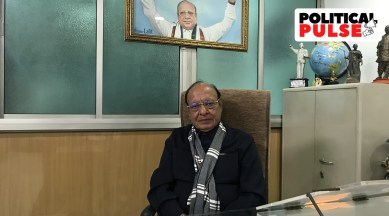Shankersinh Vaghela: ‘Scrapping of liquor ban in Gujarat can fund free education from nursery to PG’
With the Gujarat Assembly elections barely three months away, the former chief minister, Shankersinh Vaghela, 82, has started gearing up for the polls.

With the Gujarat Assembly elections barely three months away, the former chief minister, Shankersinh Vaghela, 82, has started gearing up for the polls. In a political career spanning more than five decades, he has been part of several parties, including the Jan Sangh, Bharatiya Janata Party (BJP), Congress, and Nationalist Congress Party (NCP) besides founding a couple of his own parties. He has now announced that his new outfit Praja Shakti Democratic Party (PSDP) will contest the upcoming polls that will witness a battle mainly between the ruling BJP, the principal Opposition Congress and the emerging player Aam Aadmi Party (AAP). His party’s poll manifesto has promised a “scientific” prohibition policy for Gujarat. In an interview with Vaibhav Jha, Vaghela speaks on his party’s plans for the polls and its proposed new liquor policy for the dry state. Edited Excerpts:
Tell us about your new political outfit.
The Praja Shakti Democratic Party was registered two years ago, just before the Covid pandemic. We wanted to officially launch it at a mega event. However, due to the demise of Ahmed Patel, we decided to postpone it then. It was a personal decision I took.
What happened then?
During the funeral of Ahmed Patel sahab, many Congress leaders offered me to join their party and I was in discussion with them since then. However, now I have decided to contest (the Gujarat Assembly elections) through my party and very soon we will be announcing candidates for constituencies.
You had recently claimed that the BJP, AAP and Congress have a single owner. How?
The BJP’s owner is the RSS. The AAP was supported by the RSS cadre in Punjab (Assembly polls). They cannot deny this fact, so in a way their owners are also from the Sangh. Now the Congress MLAs, once they get elected get sold out to the BJP and join the RSS – so in a way, they are also serving the same owner.
In its poll manifesto your party has proposed a new “scientific” liquor policy in Gujarat. Can you shed some light on it?
Darubandi (liquor prohibition) exists only on paper in Gujarat. Recently, so many people died after drinking hooch in the state. The rich have the option of getting health cards made to avail liquor legally while the poor are forced to buy illicit hooch, taking risks both legally and health-wise. During elections, party workers distribute liquor at the booth level. The act (banning alcohol in Gujarat)) is contradictory and artificial in nature. We are only punishing the lower and middle-income groups through this prohibition act in Gujarat.
What are your plans regarding prohibition then?
From Ambaji to Umbergaon, the entire east stretch of Gujarat, we are planning to give licence to the local Adivasi youth to grow mahua from molasses and crops. They will be able to sell mahua in certified, branded bottles just like Amul does branding of its dairy products and promoting cooperative societies. This will not only promote livelihood options but also bring in revenue for the state. Scrapping of prohibition policy will generate a revenue of Rs 30-40 thousand crore every year, which can fund the education of every person from nursery to post-graduation.
So you intend to take on the three big parties over the prohibition act?
Our party believes in a referendum. We will invite all three parties for a public debate on this issue. When Congress claims that there is a prohibition in Gujarat as a homage to Mahatama Gandhi then why have they not done the same in Rajasthan and Chhattisgarh?
You recently met Subramanian Swamy?
Yes, in the coming days I will be travelling across India to unite all anti-BJP leaders and invite them to Gujarat.
So you will also invite Nitish Kumar to campaign for you in Gujarat?
It will be difficult for him to come since he is now with Congress in Bihar. However, I will be teaming up with the likes of Akhilesh Yadav, Mamata Bannerjee and KCR.
You formed the Rashtriya Janata Party in 1995 after leaving the BJP. Later it was merged with the Congress. Will your new outfit meet a similar fate in 2022?
At that time, it was our compulsion because if we hadn’t merged our party with the Congress then BJP would have benefited. We then chose greater good over personal interest.